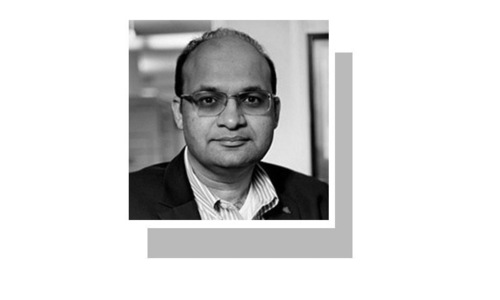IT is suddenly the flavour of the month. Everyone who is anyone is suggesting it, advocating it and pushing for it. Talk talk is better than fight fight, goes the argument. In the middle of a ferocious war of words, who has decided to smoke the peace pipe? And why?
It all happened with Maryam Nawaz Sharif’s interview to BBC. “Army is my institution,” she said. “We will definitely talk with it, but within the limits of the Constitution… [but] if you want to bring the country out of the crisis then [Prime Minister] and his government will have to go home,” she added.
Here’s the thing though: it actually did not start with this statement.
Since the formation of the opposition alliance Pakistan Democratic Movement (PDM) and the searing speech of PML-N leader Nawaz Sharif at the multiparty conference (MPC), Pakistani politics has been transformed into a series of intensifying battles escalating dangerously towards a red hot war. But beneath this scorched landscape runs an undercurrent of prudence and pragmatism. It has remained hidden from view — drowned in the noise of battle — but now it is beginning to bubble up like fresh water onto a barren surface.
This prudence cuts across party lines for a simple reason: there are rational actors on all sides. They know full well that political strategy runs in parallel streams — one public that is currently defined by severe acrimony and mutual accusations, and the other quiet, behind-the-scenes decision-making that is based on rational thought and factual assessments of the situation. The latter is now asserting itself in a bid to stop the former from hurling itself into an abyss.
But first, some context.
Currently, there are three competing strategic lines of action that are vying with each other in order to prevail upon each other. The first one, driven by PTI, is to weaken and discredit the PDM by all means possible using all state resources available. This objective is fuelled by a belief that Nawaz Sharif has burnt his boats with the establishment while other PDM players do not command enough electoral strength to threaten the PTI. In addition, this strategy is focused on saying and doing whatever it takes to further distance PML-N from the establishment.
Party insiders admit that the difference between hardliners and rationalists within PML-N is on the approach towards the establishment
The second strategic line of action banks on crafting a new transactional relationship within the prevailing situation at the expense of PTI. At least two parties within the PDM are comfortable with this strategy if it can deliver results. The transactional nature of this strategy is driven more by political gains than by political beliefs. Can some players strike a new deal with the establishment? The art of the deal is premised on a win-win outcome. This win, if it comes, however will come at the expense of the PTI.
The third strategic line of action is powered by the objective to reset the rules of governance so that the political footprint of the establishment shrinks to a more ‘acceptable’ level. PML-N leaders say this is what Nawaz Sharif is looking at while realising that the establishment will always have some role to play in the political arena. The final outcome of this strategy is also rooted in negotiations at some point. Fight, fight, talk, talk.
As long as these three lines of action compete within certain parametres, and as long as they do not become a zero-sum game that threatens to destabilise the system, all is well. But all is not well because the game of thrones underway runs the risk of becoming a zero-sum game.
Enter the rationalists.
Among the PML-N ranks, they are now asserting a policy of dialogue. Maryam’s statement in the BBC interview is an acknowledgement of these rationalists’ growing influence. And yet party insiders admit that the difference between hardliners and rationalists within PML-N is on the approach towards the establishment. On the need for the PTI’s ouster, their position is almost the same. When it comes to engaging with the establishment, varying viewpoints get interesting. Essentially, there are two streams: one says any engagement with the establishment should have a singular objective of redefining the rules of governance in order to reduce the political role of the establishment; the second says the engagement should be more flexible in terms of intended outcomes and direct confrontation should be avoided.
Among PTI ranks, the rationalists are now also asserting the fact that governance debacles, especially in Punjab, are taking a toll on the party’s central narrative. They also realise that the government cannot afford a non-existent working relationship with the opposition, and therefore something needs to be done to at least allow a natural flow of professional cooperation between the treasury and opposition benches.
The public posturing will not change for now — at least not substantially. At the PML-N’s Swat jalsa on Friday, Nawaz Sharif poured scorn over the inquiry report of the Karachi incident. His tone and tenor were the same as seen in Gujranwala and Quetta. Maryam Nawaz’s speech was, however, aimed solely at the government and she mentioned the establishment only in passing.
PTI gunslingers are also not about to holster their weapons. However, the idea of a dialogue is now floating temptingly in the politically toxic environment. Key stakeholders in the government, opposition and establishment know well that the situation cannot be allowed to edge towards the precipice. And yet, dialogue remains a mere an idea that presently has no platform to manifest itself in. Many concerned people are doing their best to find common ground that can, at the very least, enable some communication that can slow the ongoing descent into a full-blown crisis.
The hardliners want to power their way across limits. The rationalists recognise the limits of their power. The pendulum is swinging.
The writer is Dawn’s resident editor in Islamabad.
Twitter: @fahdhusain
Published in Dawn, November 14th, 2020












































